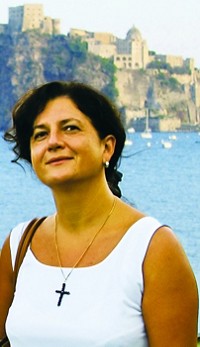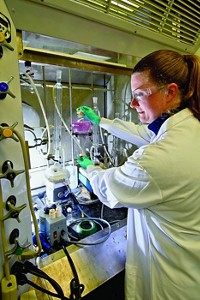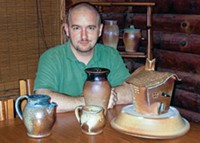Advertisement
Grab your lab coat. Let's get started
Welcome!
Welcome!
Create an account below to get 6 C&EN articles per month, receive newsletters and more - all free.
It seems this is your first time logging in online. Please enter the following information to continue.
As an ACS member you automatically get access to this site. All we need is few more details to create your reading experience.
Not you? Sign in with a different account.
Not you? Sign in with a different account.
ERROR 1
ERROR 1
ERROR 2
ERROR 2
ERROR 2
ERROR 2
ERROR 2
Password and Confirm password must match.
If you have an ACS member number, please enter it here so we can link this account to your membership. (optional)
ERROR 2
ACS values your privacy. By submitting your information, you are gaining access to C&EN and subscribing to our weekly newsletter. We use the information you provide to make your reading experience better, and we will never sell your data to third party members.
Business
Shri Thanedar
A chemist from modest origins creates a formidable analytical testing business
by Michael McCoy
November 13, 2006
| A version of this story appeared in
Volume 84, Issue 46
Shri Thanedar's journey from a poor childhood in India to the helm of a group of chemistry-based companies is a classic American dream story. And with a recent custom synthesis acquisition and the formation of a new pharmaceutical services company, it's a continuing story as well.
Thanedar's flagship firm is Chemir Analytical Services, a suburban St. Louis provider of industrial problem-solving and analytical testing services. Combined, his companies are expected to have sales this year of $24 million; Thanedar is targeting $60 million in sales by 2009.
Growing up in Belgaum, India, some 300 miles south of what was then called Bombay, the idea of one day running a multi-million-dollar American enterprise was no doubt quite improbable to Thanedar. The oldest boy among nine siblings, his immediate concern was helping feed his family.
By 1974, at the surprisingly young age of 18, Thanedar had earned a bachelor's degree in chemistry from a local college and was on his way to a full-time job at an atomic research center in Bombay. He earned an M.S. in chemistry while working as a health technician at the center and soon got to thinking about obtaining a Ph.D., and possibly working, outside the country.
He applied to the University of Akron, in Ohio, after learning about its strength in polymer chemistry and was admitted in 1979. "I was told it would be cold in Akron, so I brought along a sweater," Thanedar says. It was below zero when he landed in New York City that February.
By the fall of 1982, Thanedar had his Ph.D., but the U.S. was in recession and he couldn't find a job. At a regional American Chemical Society meeting, he met David Curtis, head of the University of Michigan's chemistry department, and took up Curtis' offer to come to Ann Arbor for a postdoc. In 1984, he completed the postdoc and was finally getting job offers.
As Thanedar recalls, he was tired of the cold, and his most southern job offer came from Petrolite in St. Louis. He moved there and began using his doctorate in Ziegler-Natta catalysis to synthesize long-chain aliphatics as additives for fuels, coatings, and other products.
Although Thanedar enjoyed the work, he says he became frustrated by his inability to make a real impact at the company. "A lot of the time, Ph.D. chemists get stereotyped into doing just technical work," he says.
With a newborn son and a wife finishing a medical school residency, it was a bad time for Thanedar to set out on his own. Instead, he decided to find a small company that he could join and perhaps someday own. "I opened the Yellow Pages," he says. "The manufacturing companies were all large, so I looked under analytical labs."
One of his calls was to St. Louis-based Industrial Testing Laboratories. Although owner Allen Siegal didn't have a spot for Thanedar, he recommended a nearby outfit, Chemir Laboratories, owned by Clara Craver, an expert in infrared spectroscopy. It turned out that Craver was looking to sell the business, but she had a problem. "Without her, the company was nothing," Thanedar says.
His solution was to apprentice himself at night and on weekends for $15 per hour. In October 1990, after a year as Craver's protégé, he bought the company for $75,000. Sales in his first year were $150,000. As Thanedar says, "We grew one customer, one chemist at a time."
He brought in other analytical equipment and expanded the range of problems that Chemir could solve. Typical customers came to include the contact lens solution maker whose product is causing an eye irritation, or the pen maker that wants to know how a competitor's ink dries so quickly, or the knee implant company faced with a product that is prematurely deteriorating.
In 1996, Thanedar bought a St. Paul, Minn., lab called Betec; three years later he acquired Siegal's Industrial Testing Labs. By 2005, he had bought three more companies and had raised Chemir's sales to $16 million.
As Chemir grew, so did its business with the pharmaceutical industry, to 50% of sales today, Thanedar says. Pharma projects range from finding the faulty gasket that is causing contamination in an aspirin plant to sleuthing out the composition of a branded drug pill for a generic drug company.
In the past year, the company has sharpened its focus on pharma even further. In May, it acquired Gateway Chemical Technology, a small, St. Louis-based custom synthesizer of pharmaceutical ingredients, bioorganic compounds, and other fine chemicals. Thanedar has since renamed the firm IQsynthesis and is upgrading its labs to the Food & Drug Administration's current Good Manufacturing Practices standards.
Then last month, he established Cyanta Drug Development Services. Created by carving out Chemir's pharmaceuticals-related operations, Cyanta will provide drug development services such as analytical development, stability and method validation, and formulation and deformulation studies.
Thanedar is now renovating a building adjacent to Chemir's headquarters with the goal of moving Cyanta there next year. As he explains, a walk through Chemir's labs takes a visitor past benchtops covered with anything from airplane parts to shoes to hundreds of ballpoint pens. "That's fine for other industries, but pharma doesn't like it," he says.
By Thanedar's count, his family of companies today employs 160 people, close to 40 of whom are Ph.D. chemists. He owns the business outright, he says, and is looking for more acquisitions in the fragmented analytical chemistry field.
Although his ambitions are big, Thanedar seems to take a modest view of himself. "Deep down, I'm just a chemist," he says.






Join the conversation
Contact the reporter
Submit a Letter to the Editor for publication
Engage with us on Twitter